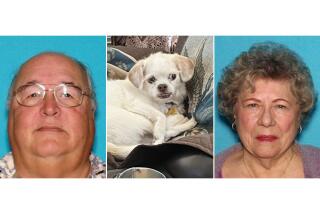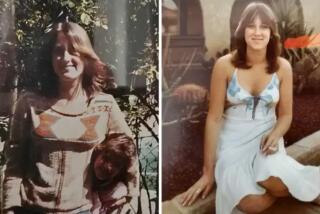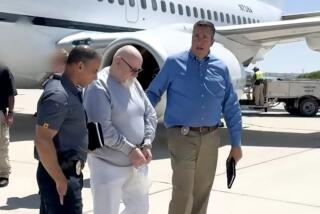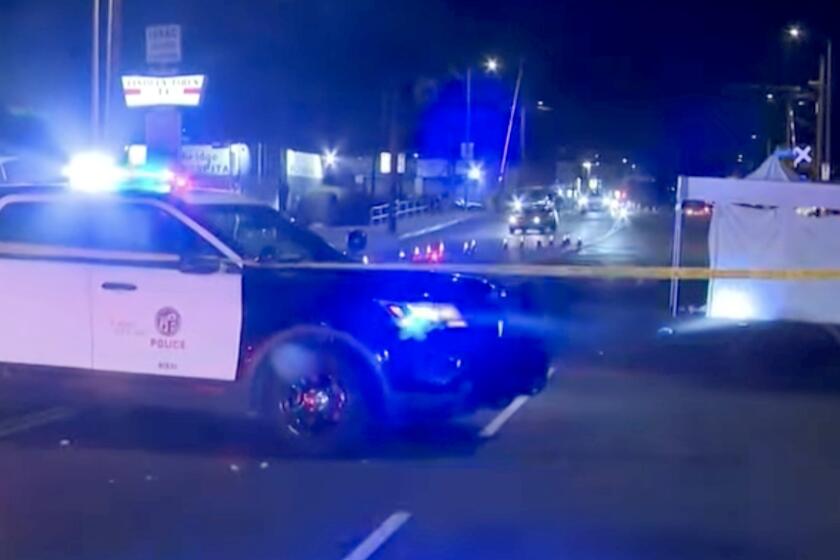Jury gets murder case in woman’s ’81 disappearance from Torrance
It has been more than three decades since Michael Lubahn Clark’s high school sweetheart vanished from their Torrance home.
Last week, the 59-year-old gray-haired painter told jurors that the night his wife disappeared, they had quarreled over selling the house. He said he awoke early the next morning to find Carol Lubahn gone, her red Audi missing and the garage door open.
“I closed the garage door and went to bed,” he testified. “I thought she was coming back.”
She never did.
The prosecution has argued she didn’t because Clark killed her, angry over her desire to sell the house and the prospect that she was preparing for a divorce. Deputy Dist. Atty. John Lewin has based his case on inconsistent statements Clark made through the years regarding his wife’s disappearance.
“The defendant is the one that sunk his own ship,” Lewin told jurors this week during closing arguments. “At the end, it’s just a web of lies.”
Torrance police reopened the cold case and eventually arrested Clark last year at his Huntington Beach home — 30 years after Lubahn’s disappearance.
Lubahn’s body has never been found. And no physical or eyewitness evidence links the former Torrance resident to his wife’s disappearance.
“There is no definitive evidence — one way or the other — about what happened to Carol Lubahn,” Clark’s defense attorney Kevin D. Donahue told jurors earlier this week. Ultimately, Donahue continued, the prosecution’s case is built on “guessing and speculation.”
Jurors began deliberating the case Tuesday. If they convict Clark of second-degree murder, he faces 15 years to life in prison.
Lubahn and Clark met at Torrance’s North High School, she a sophomore, he a junior. They soon had a baby boy, and they married a year later, public records show. Lubahn was 17, Clark 18. About two years later, they gave birth to another child, this time a girl.
But after about 10 years of marriage, Clark knew that Lubahn, who at 26 was studying architecture at Torrance’s El Camino College, had outgrown their marriage, Lewin argued. At the time, Clark worked for Lubahn’s father as a painter.
When Lubahn approached Clark with papers the night of March 30, 1981, to put their house up for sale, Clark refused to sign.
Fearful that the next step after selling their home on Cranbrook Avenue would be a divorce and the possible loss of employment from his father-in-law, Clark snapped, Lewin contented. An affair Lubahn had with a classmate may have played into his anger as well, the prosecution argued.
“Something happened that night, “ Lewin told jurors Monday. “And he killed her.”
The defense said Clark didn’t know about the affair until after his wife disappeared.
During his closing argument Monday, Donahue accused the Torrance police and the prosecution of first deciding Clark was guilty, then “putting [the case] together.
“They had an agenda from the beginning,” the defense attorney told jurors. “It’s the husband-did-it syndrome.”
Donahue raised the prospect Lubahn is still alive, and may surface one day. “It happens,” he told jurors this week.
After Lubahn disappeared, Clark remained close to her family. Eventually, he took over her father’s painting business and changed his last name.
Clark — known to shirk conflict and be unflappably honest, according to longtime friends who testified on his behalf — later remarried and has since divorced his second wife.
But over the years, Lewin said, Clark’s retelling of what happened on that fateful spring night and early morning don’t add up. Lewin told jurors that Clark changed key points in his story over the years: whether Lubahn came to bed that night, whether he saw her drive away and whether she was there when he awoke the next morning.
Clark’s attorney said Monday that there is no evidence of a murder and that the prosecution has placed an unreasonable demand on his client’s memory.
“Your memory,” Donahue told jurors, “is affected by the passage of time.”
More to Read
Sign up for Essential California
The most important California stories and recommendations in your inbox every morning.
You may occasionally receive promotional content from the Los Angeles Times.










